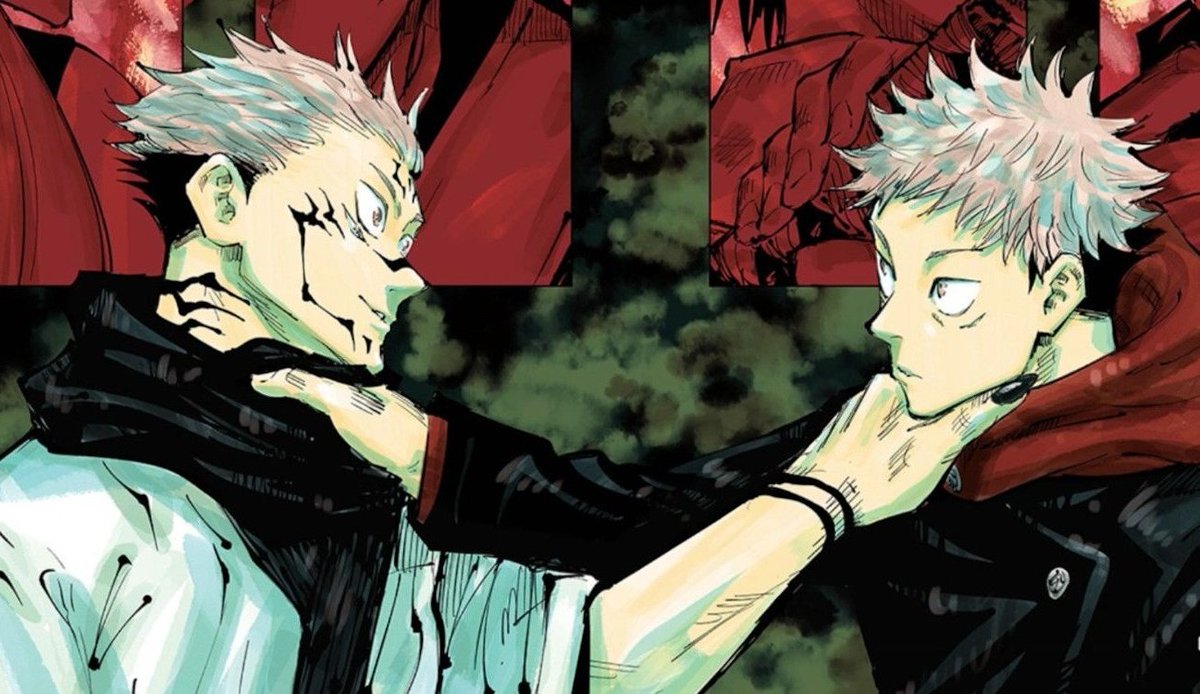i wanna revisit this old thread with the context of the latest chapter, the conclusion of Gojo vs Sukuna.
this is a thread on #JJK236 🧵
this is a thread on #JJK236 🧵
https://twitter.com/det_critics/status/1636784357116624898
i wrote that thread just after Sukuna started his battle with Yorozu, and basically everything i say in there has been substantiated by Gojo vs Sukuna, so do check it out first.
let me elaborate on the Gojo bit here. Gojo, from birth, has been "blessed". a cursed technique that makes him invulnerable, an ability of prophecy that allows him to see through and perceive all things related to CE, alluding to enlightenment...
https://twitter.com/det_critics/status/1636784623572361216?t=0IJVP90Untfi8-n8BCi8fQ&s=19
not to mention, his very name is an indication of transcendence (satoru is the root of the term "satori" which means enlightenment). needless to say, his whole identity is rooted in his strength.
take his strength away, and what is he?
take his strength away, and what is he?
this is the same question that Gojo himself "ran" from in Shibuya. his face reflected in the eye of the Prison Realm is a literal void.
this is just the start of the nature of Gojo's abilities exposing his own identity crisis.
this is just the start of the nature of Gojo's abilities exposing his own identity crisis.

the effect of his domain Unlimited Void is "being given everything, but unable to do anything." does this not perfectly parallel Gojo's own lamenting his inability to save Geto?
he couldn't see Geto's inner turmoil for months, and this is AFTER his "enlightenment" to boot.


he couldn't see Geto's inner turmoil for months, and this is AFTER his "enlightenment" to boot.
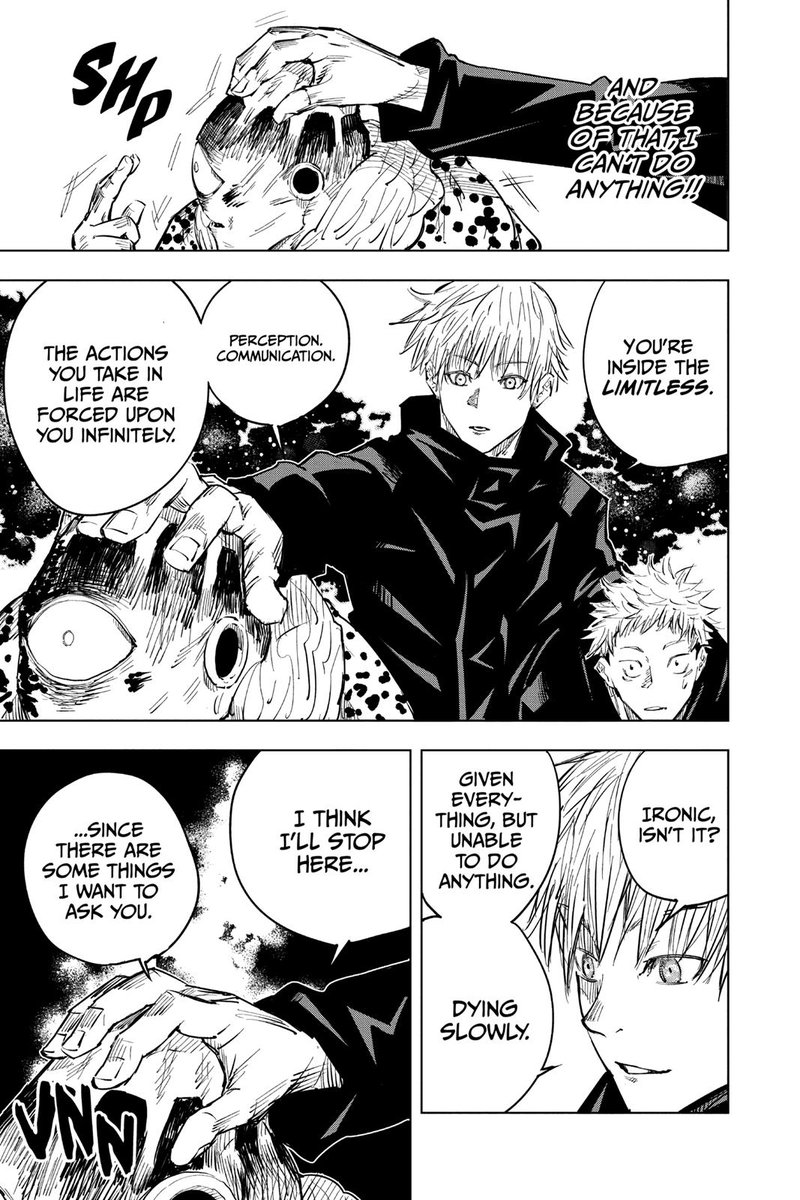
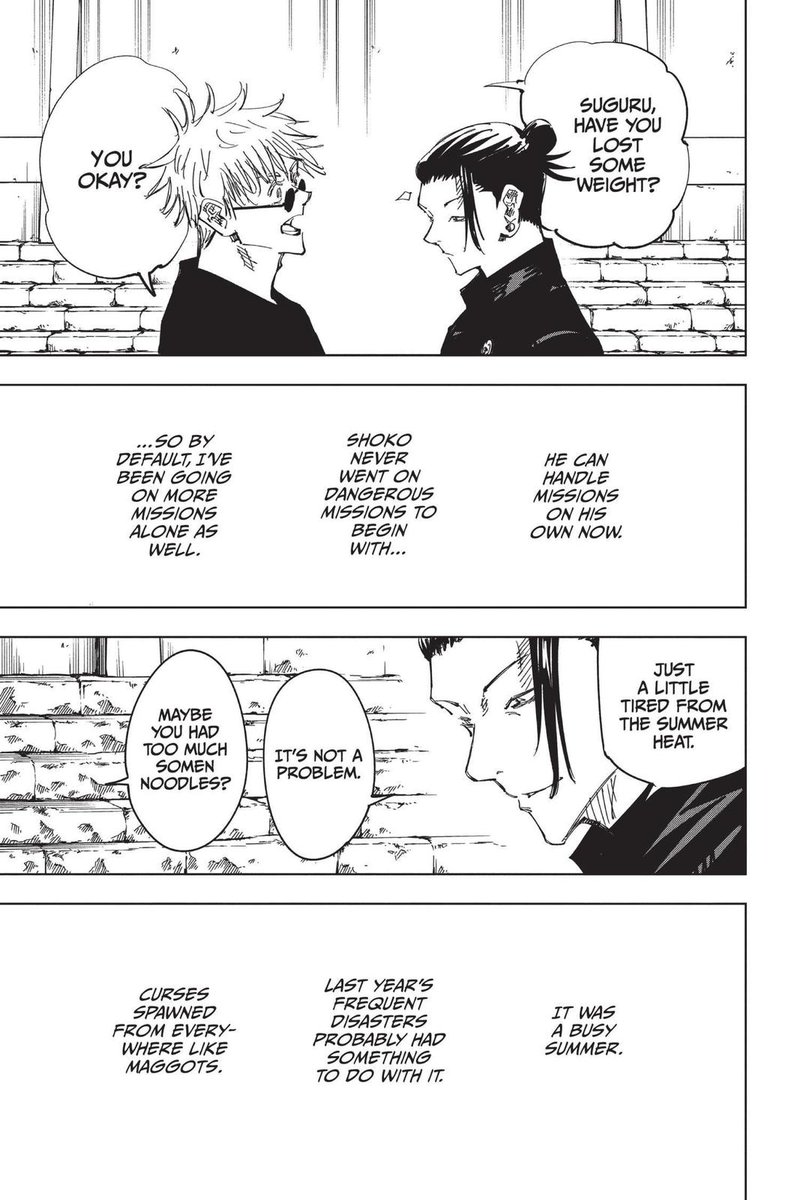
anyway, what I'm getting at is that Gojo's identity crisis, verbalised and perhaps exacerbated by Geto's question "are you Gojo cus you're the strongest or are you the strongest cus you're Gojo", is pretty explicitly symbolised by the infinity, another one of his abilities. 
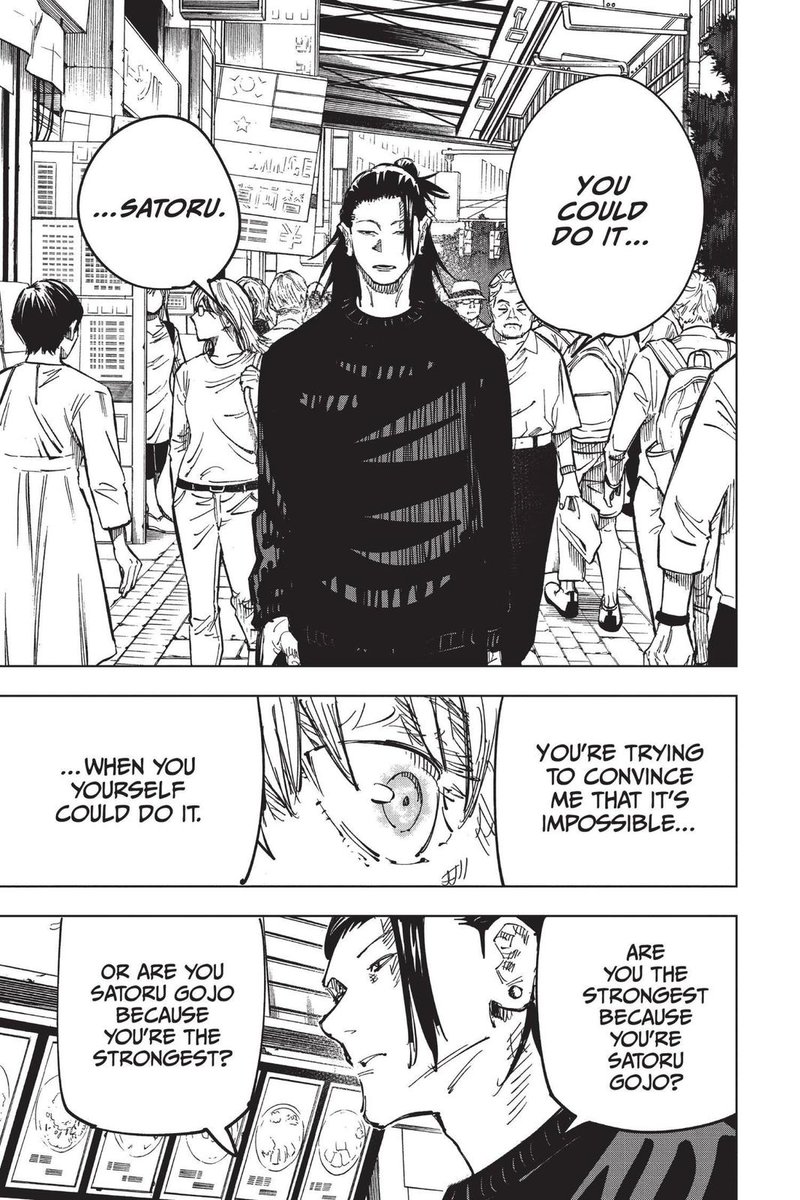
think about it, it literally doesn't allow anybody to touch him lol.
conversely it also means he can't reach anybody, and this is again verbalised in the latest chapter. he's basically in a separate plane of existence.
conversely it also means he can't reach anybody, and this is again verbalised in the latest chapter. he's basically in a separate plane of existence.
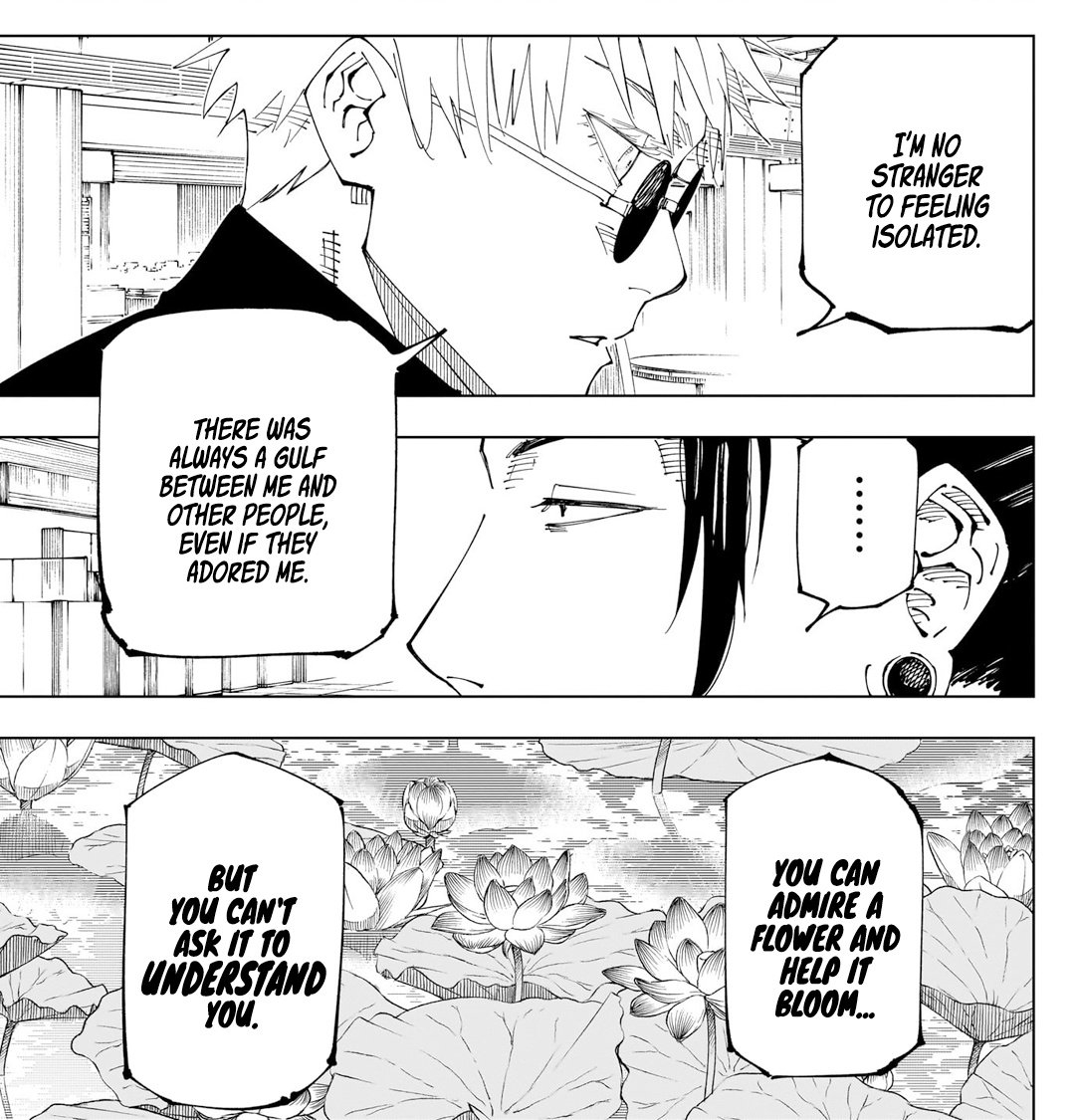
the first time his infinity was breached, it was Toji challenging Gojo's status as the strongest, and consequently shattered the walls Gojo built around himself. he could be reached after all.
to that, Gojo responded by simply rebuilding them, stronger than ever before.


to that, Gojo responded by simply rebuilding them, stronger than ever before.
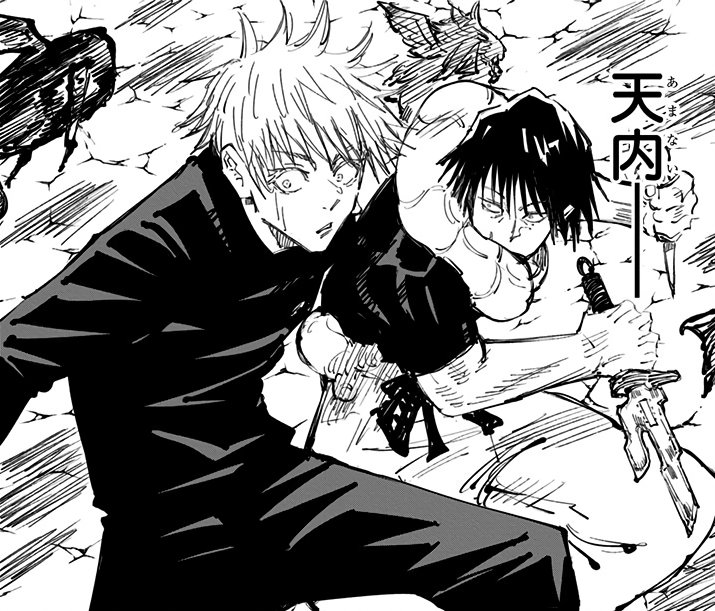
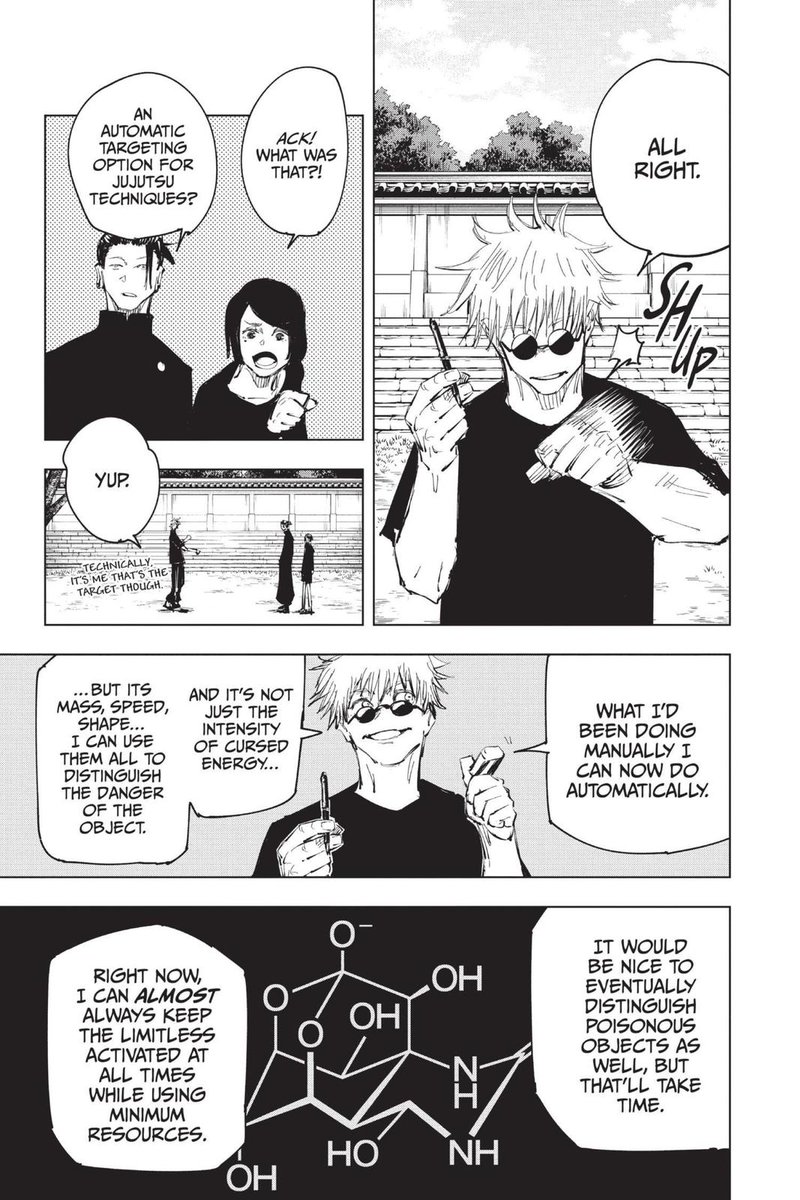
with the infinity now automatic and not requiring effort to maintain, Gojo was undeniably the strongest, and undeniably forlorn for it.
this is why it's significant that Sukuna didn't just breach the infinity. he cut the spacetime Gojo occupied along WITH the infinity.
this is why it's significant that Sukuna didn't just breach the infinity. he cut the spacetime Gojo occupied along WITH the infinity.
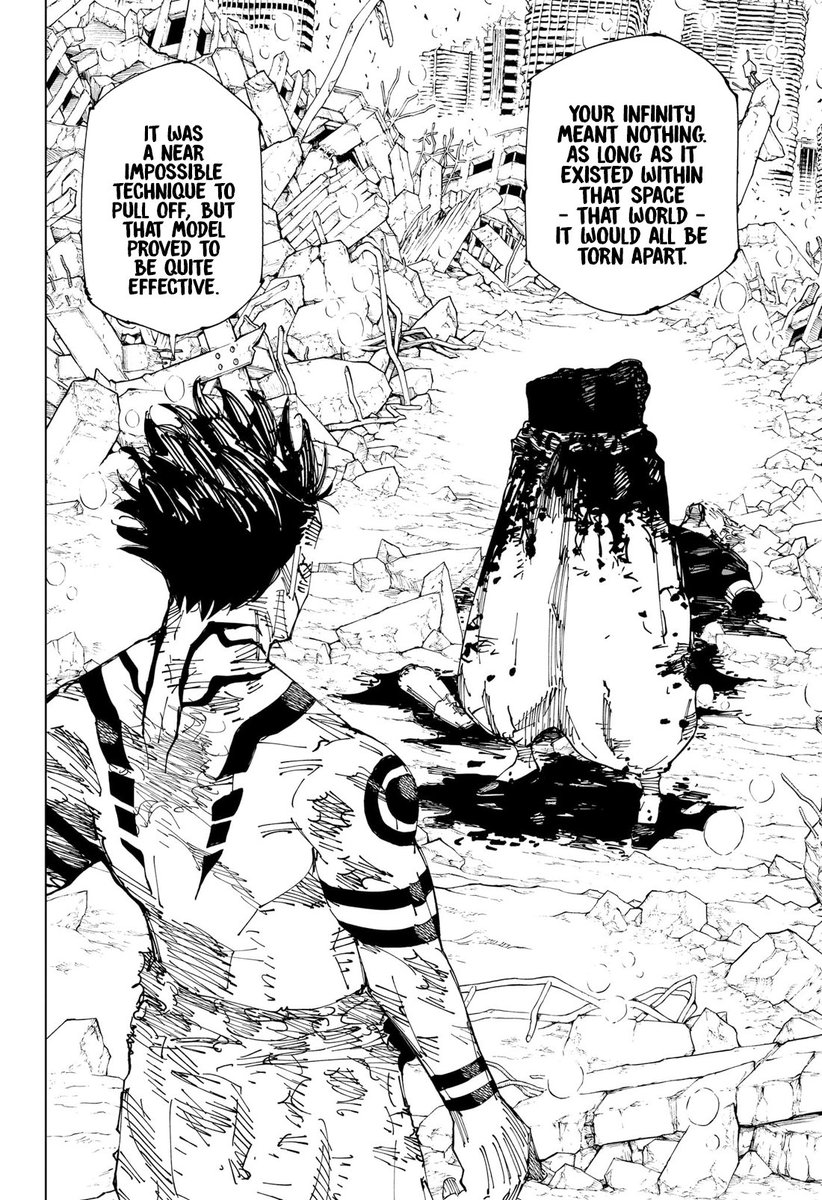
meaning Sukuna doesn't just reject Gojo's inherent position as the strongest. he shatters the borders between Gojo's realm of separate existence and the rest of the world, almost as if they were illusory. he brings Gojo back into the folds of the world with everybody else. 
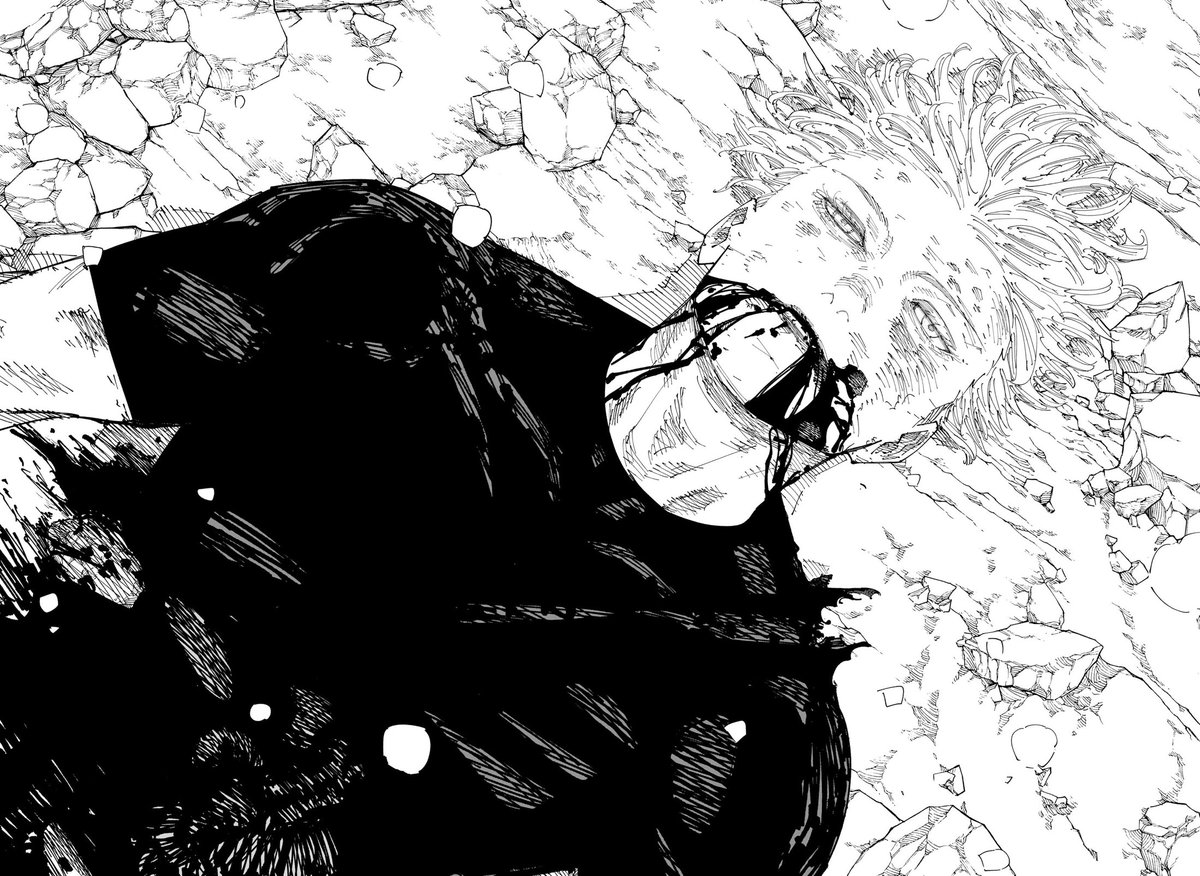
this is triply emphasized by:
1. Gojo's pre-death vision taking place at a time where he was constantly using the infinity, possibly the longest he's had it manually active, but now he doesn't have to anymore. he's not alone anymore.


1. Gojo's pre-death vision taking place at a time where he was constantly using the infinity, possibly the longest he's had it manually active, but now he doesn't have to anymore. he's not alone anymore.
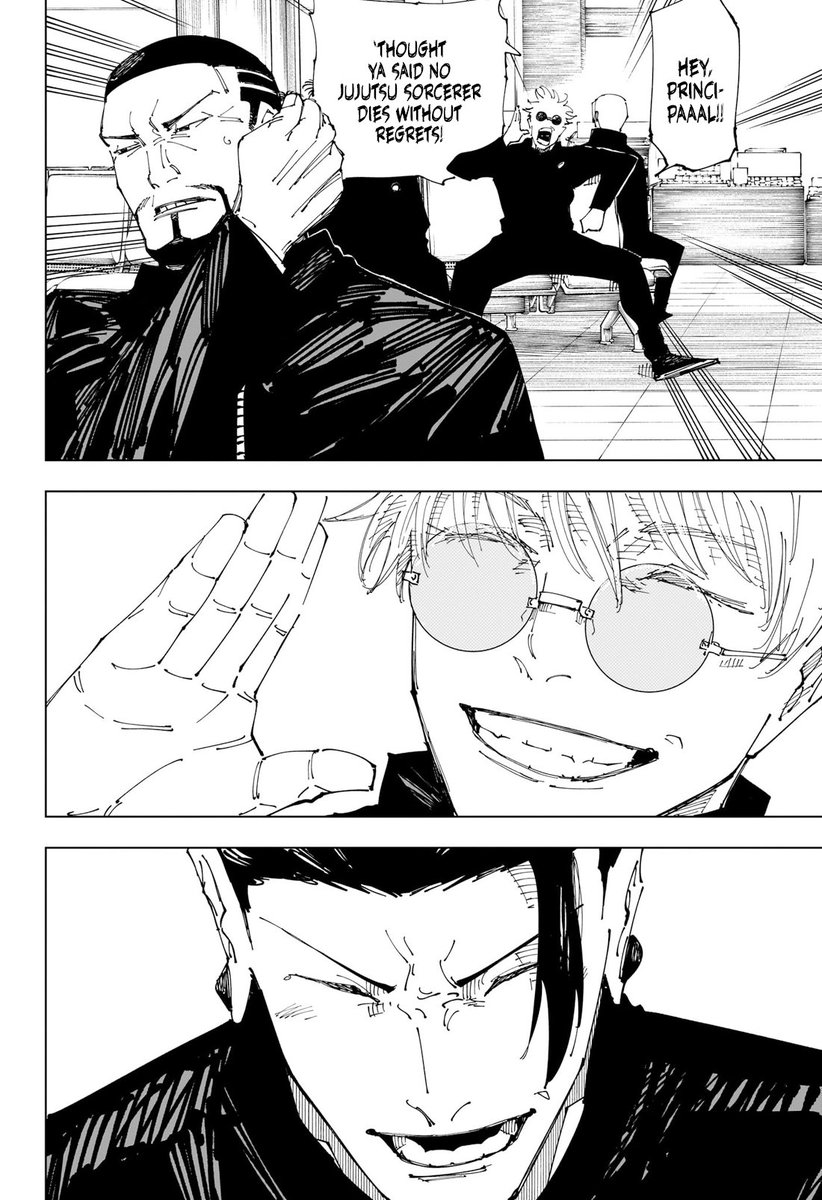
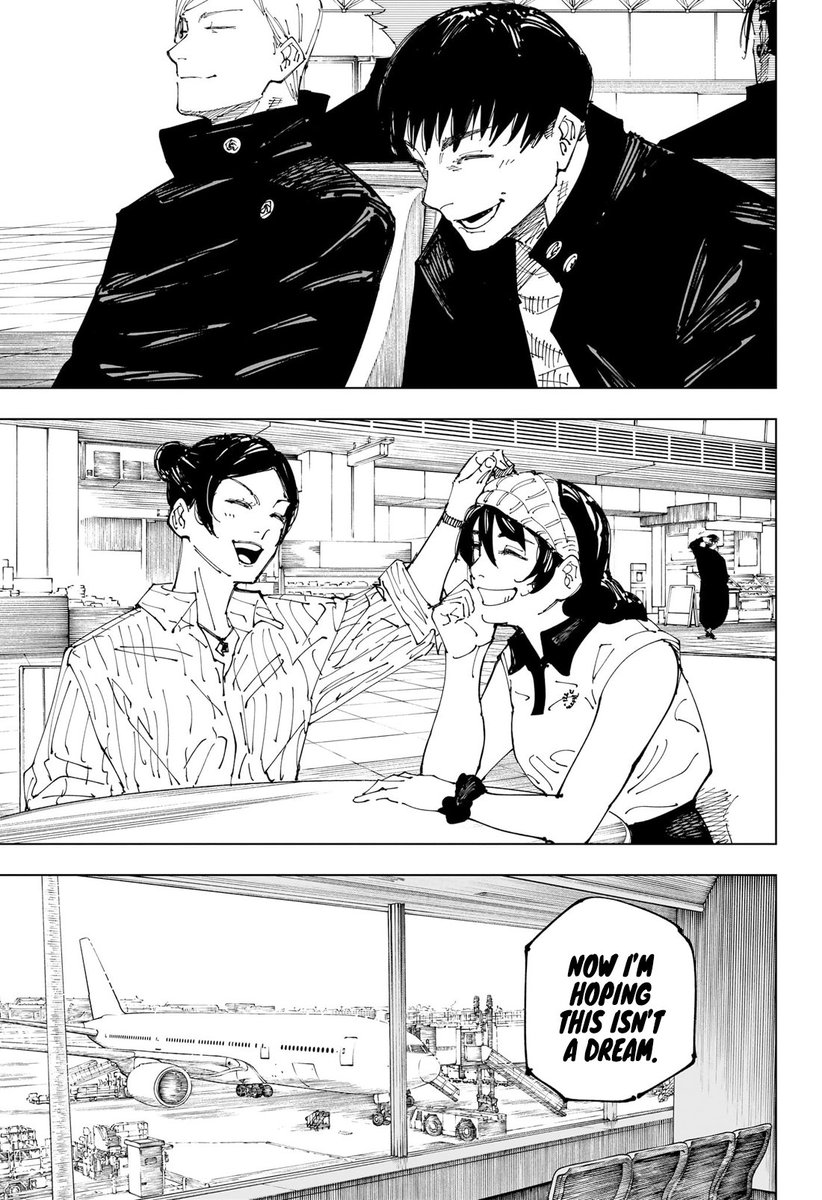
2. the function of the attack that defeated Gojo being something that can't be comprehended, and the same being reflected in a few different ways.
one, Gojo himself, with his Six Eyes, couldn't comprehend it. two, the readers couldn't possibly comprehend it even if we'd seen it.


one, Gojo himself, with his Six Eyes, couldn't comprehend it. two, the readers couldn't possibly comprehend it even if we'd seen it.
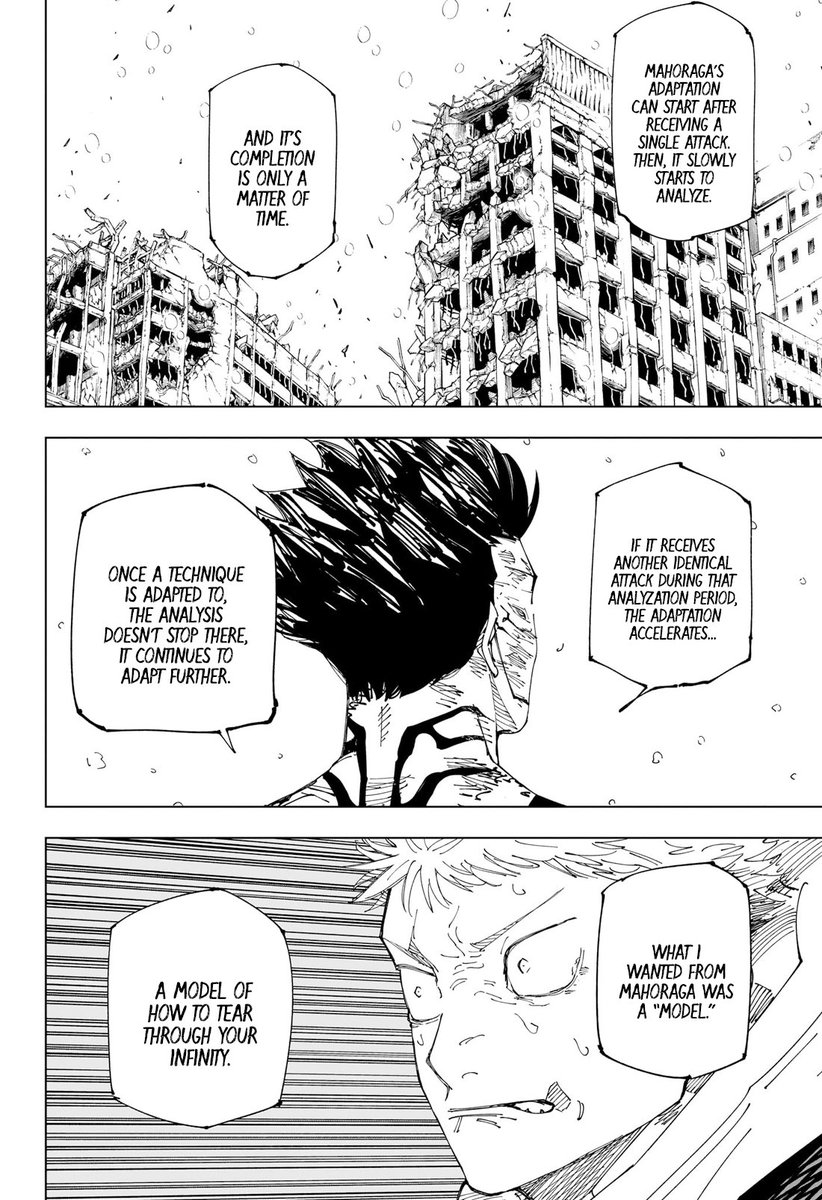
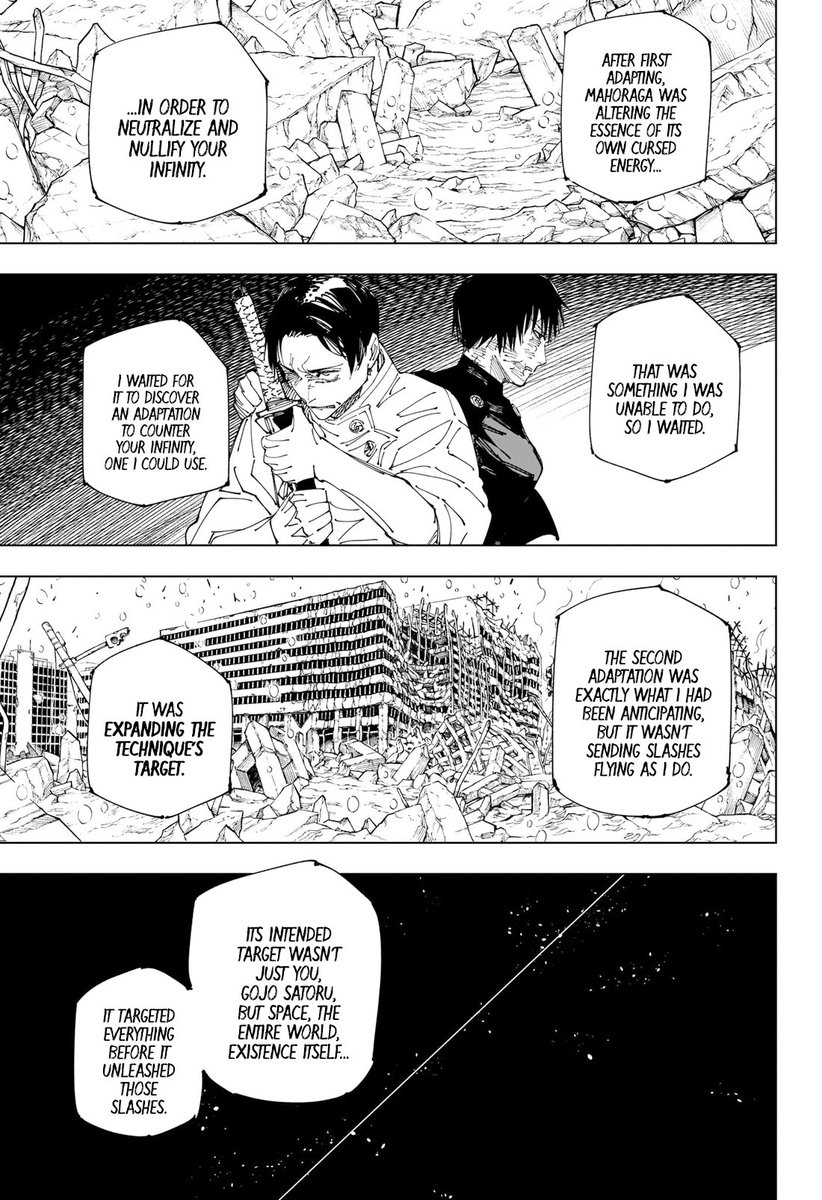
this is one of the reasons why the slash isn't actually shown, from a metatextual standpoint. seeing something you don't understand is the same as not seeing it. the fact that we don't even see Cleave and Dismantle until they actually hit the opponent substantiates it + 
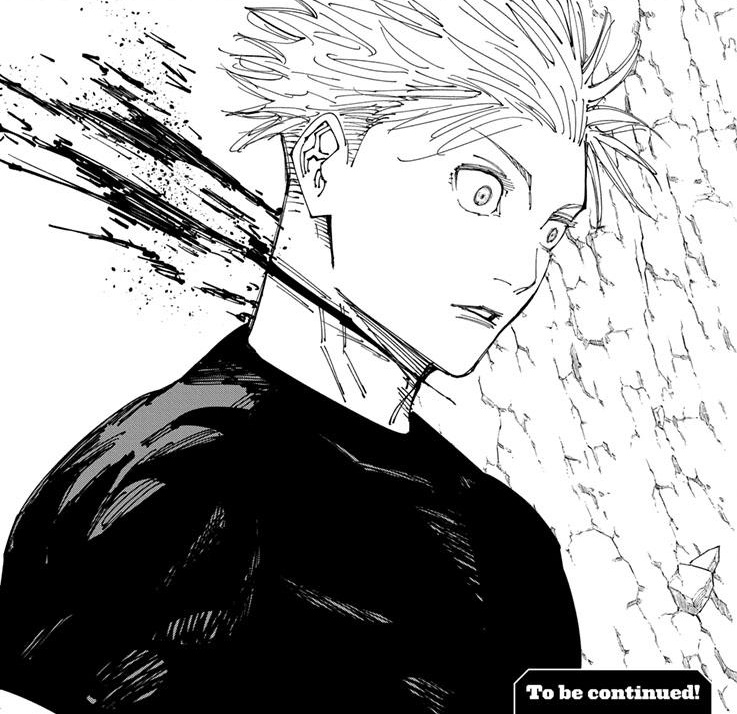
and also brings up the third point, nobody in the series can "understand" Sukuna. not Gojo, who actually came the closest. not even the nigh-omniscient narrator, who admittedly knows him enough to narrate about his nervousness for the first time in a millennium. 
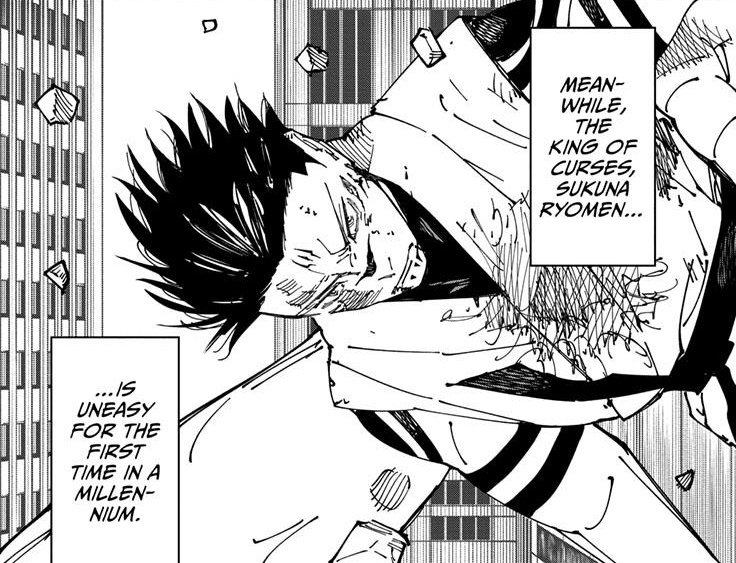
but beyond that, not even she understands his strategies. when Gojo is questioning why Sukuna isn't using 10S early on in the fight, there's a very intentional narration box that overlaps with Gojo's own thoughts. the narrator herself is confused as to his plans, + 
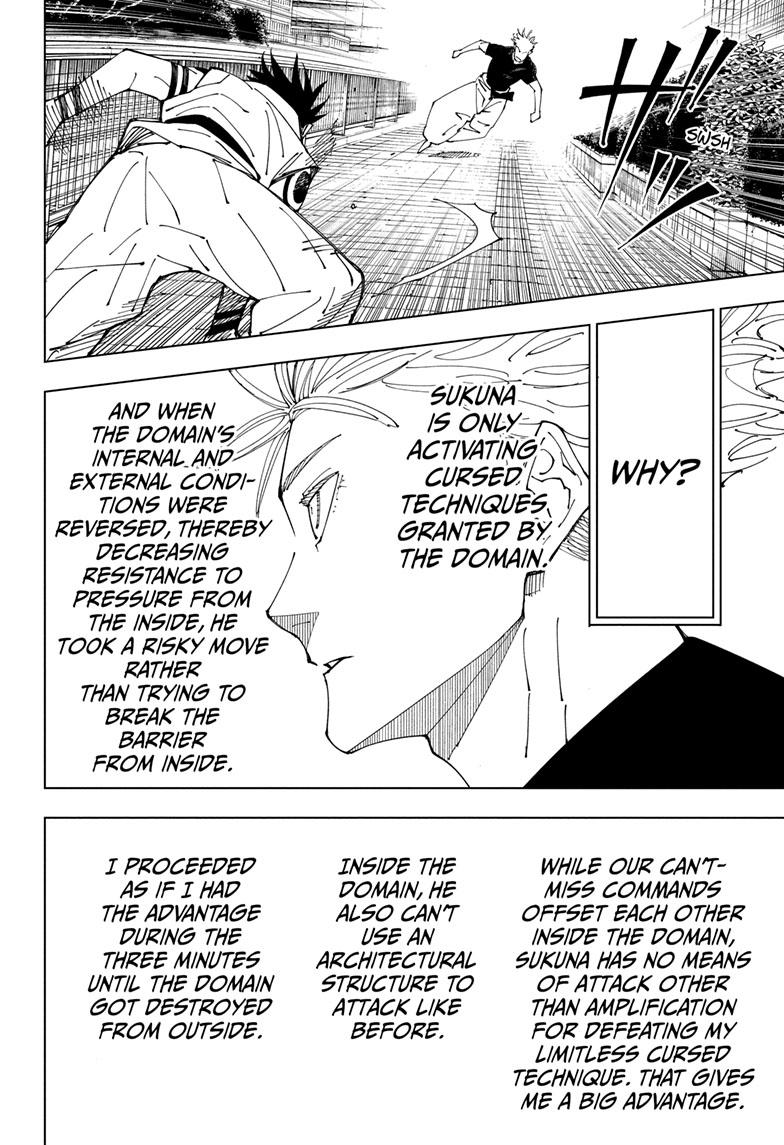
hence Sukuna himself having to explain his final attack, whereas it was either Kusakabe n them or the narrator that explained every previous attack.
the narrator not being fully privy to Sukuna's thoughts is not a new thing btw ↓
the narrator not being fully privy to Sukuna's thoughts is not a new thing btw ↓
https://twitter.com/det_critics/status/1636784944503726080?t=ssnTVMjVewYo60alKiHdoA&s=19
it ties into a very consistently built plot thread that people, in series and out, don't really understand Sukuna. what we "know" about him is an imposition of our own flawed perception. we can never truly understand a being like him. 
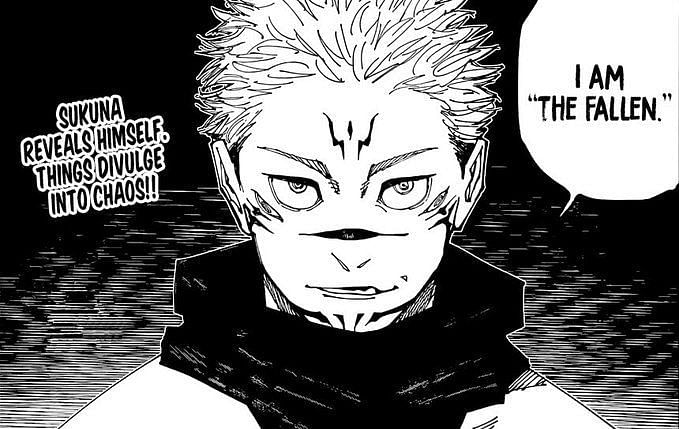
the number of ways this fact is stressed on is kinda ridiculous. for one, Gojo, who seems to occupy the same position in the narrative as Sukuna, is entirely a newly constructed being for the sole purpose of being the ceiling of power in JJK.
but Sukuna is different.
but Sukuna is different.
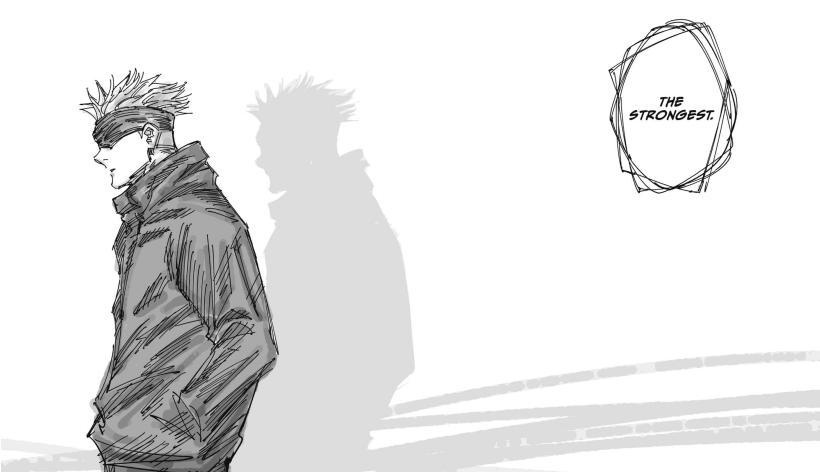
Sukuna, as an idea, is not merely constructed by Gege. Ryomen Sukuna was a real being who is both worshipped as a deity and feared as a calamity in certain regions of Japan. when we look into his history, it seems a lot like Gege has simply inserted Sukuna, as is, into JJK. 
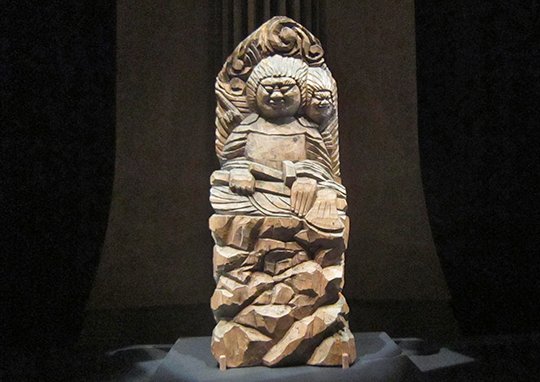
this substantiates my assertion made in the thread that Sukuna's existence is independent of anything in the story; and in a meta sense, this axiom includes the author of JJK himself. Sukuna existing isn't predicated on Gege imagining him up like he had to do with Gojo.
but let's finally move on.
3. through the framework i elaborated on in the Sukuna thread, its evident that the narrative aligns with Sukuna. and despite Gojo seemingly occupying the same position as him in the narrative (admittedly, by brute force), this still holds true.
3. through the framework i elaborated on in the Sukuna thread, its evident that the narrative aligns with Sukuna. and despite Gojo seemingly occupying the same position as him in the narrative (admittedly, by brute force), this still holds true.
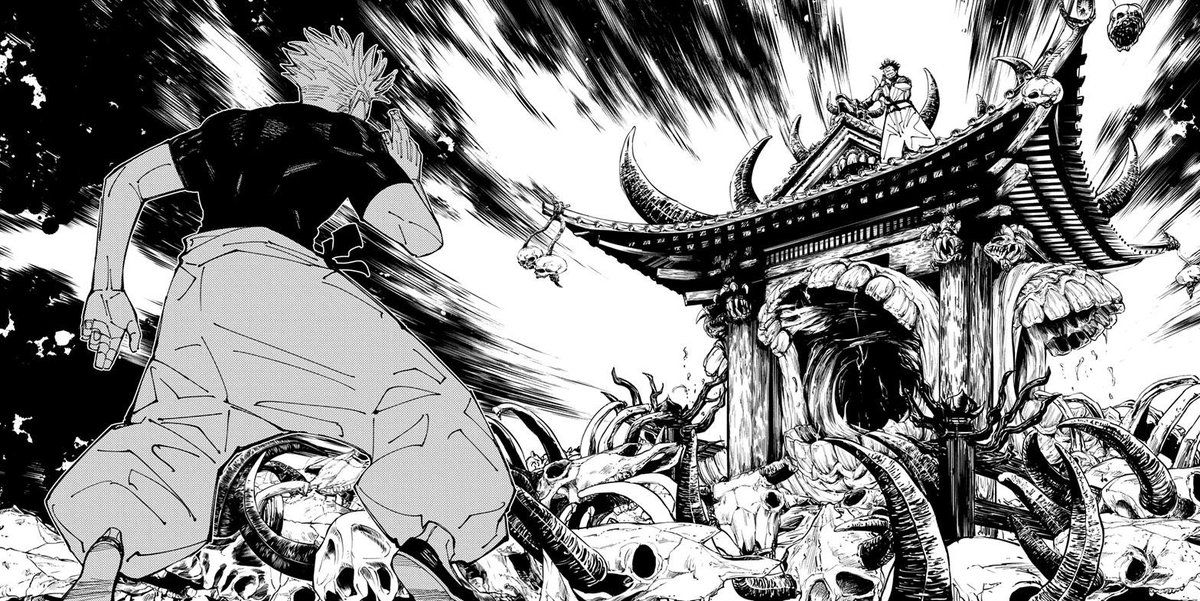
the way Gojo's conclusion is framed is very similar to how Jogo's death at the hands of the same opponent is framed. an attack whose power was so awesome that even the audience couldn't see it, a vision in the head of the victim making peace with himself, and then the aftermath. 
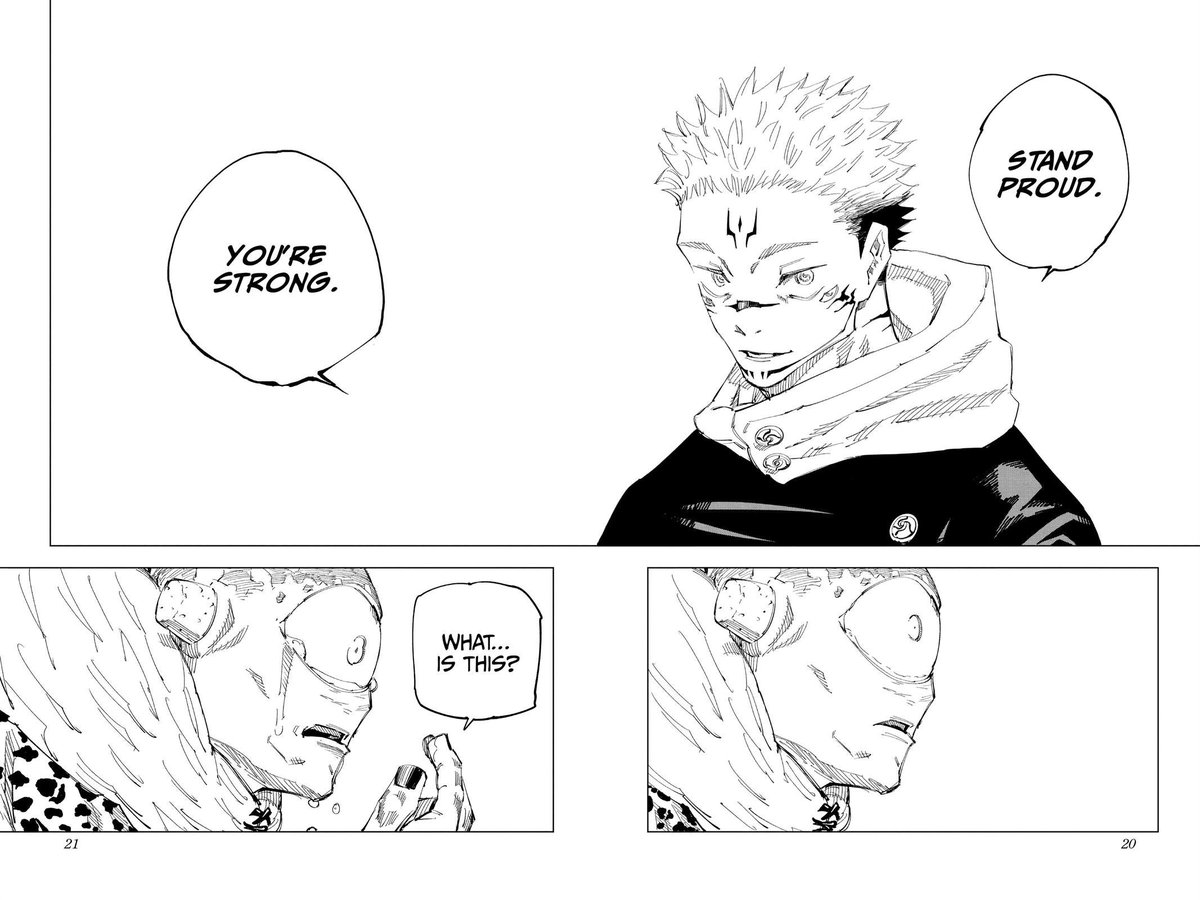
in fact, its pointedly similar to how Toji dies too. we don't actually see the Hollow Purple take half his torso, we just jump into an inner monologue and then the aftermath is visible for the audience.
the commonality between Jogo and Toji? both are "ordinary".


the commonality between Jogo and Toji? both are "ordinary".
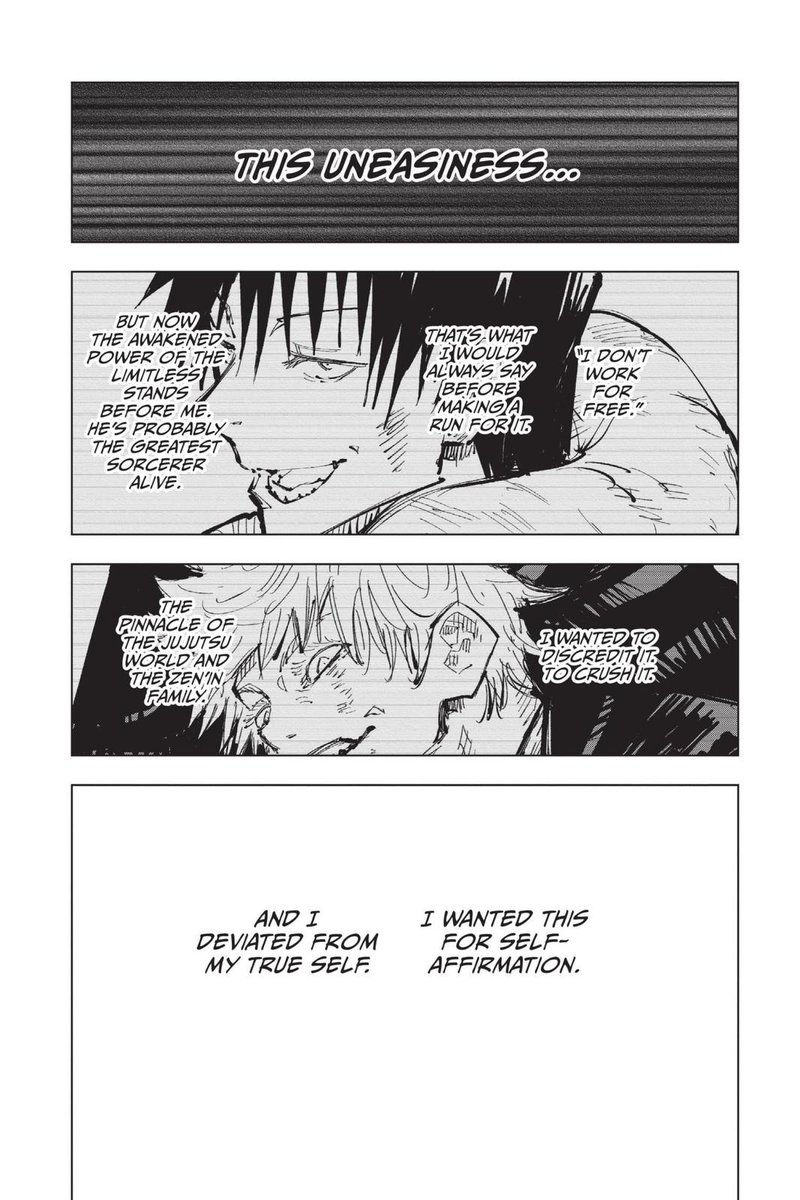
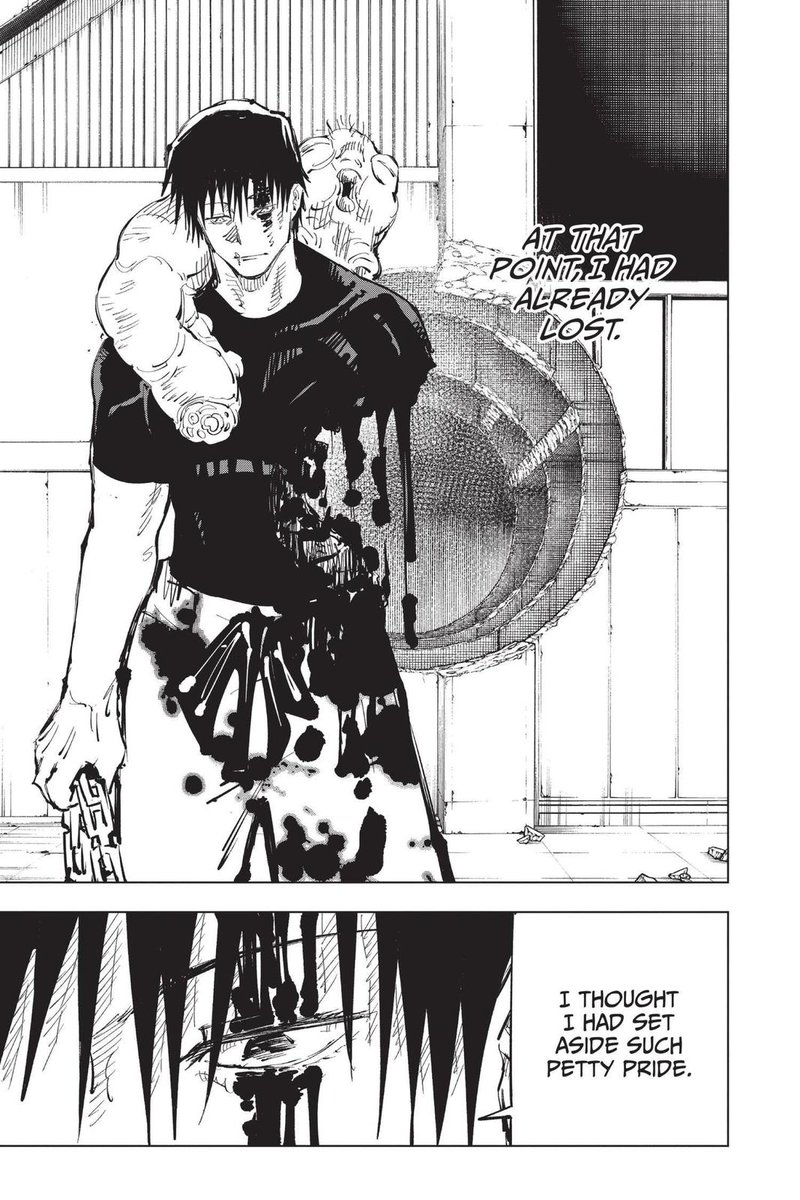
neither of them reached the heights that Gojo and Sukuna occupied. they died an ordinary death.
and Gojo died the same way. an ordinary death. the feature of the narrative aligning itself to Sukuna makes itself known again, what with Sukuna having called Gojo an ordinary guy.


and Gojo died the same way. an ordinary death. the feature of the narrative aligning itself to Sukuna makes itself known again, what with Sukuna having called Gojo an ordinary guy.
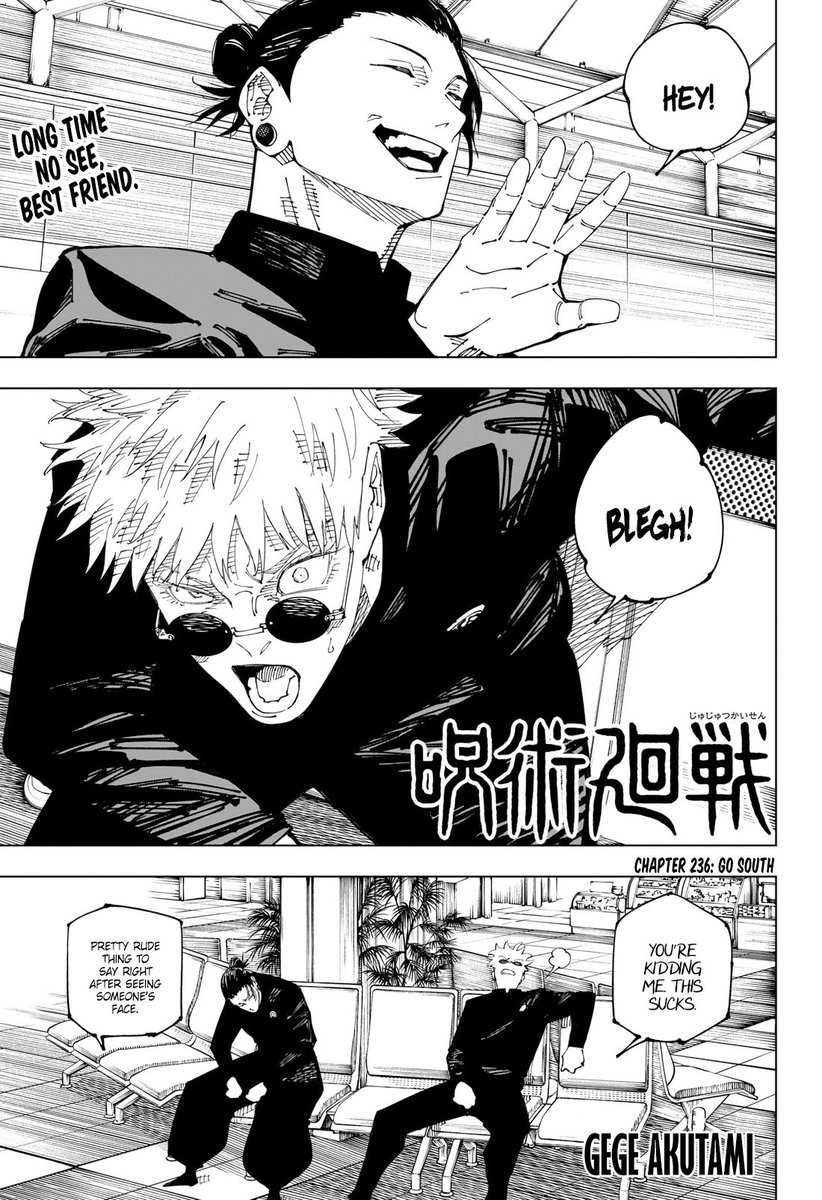
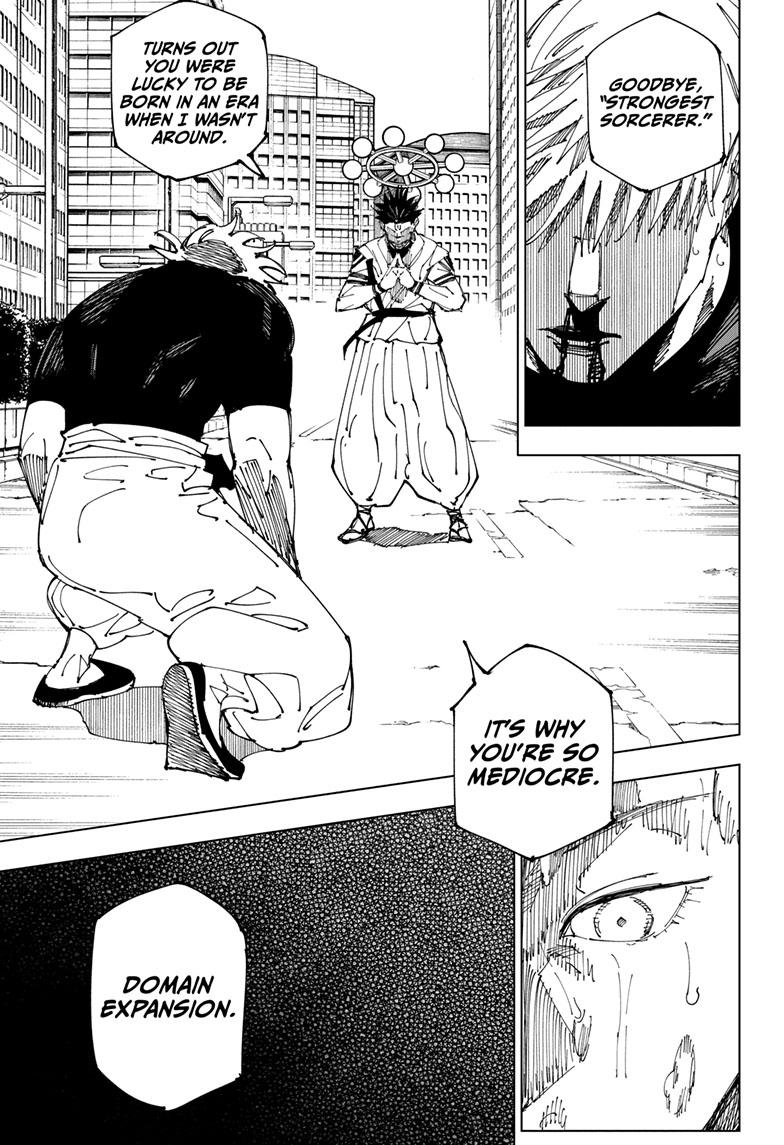
but the kicker is, Sukuna is immensely moved by Gojo anyways. even if the narrative puts Gojo down to the level of an ordinary guy in how it presents his death, the King of Curses never forgetting him as long as he lives is undeniably the higher honour that trumps all else. 
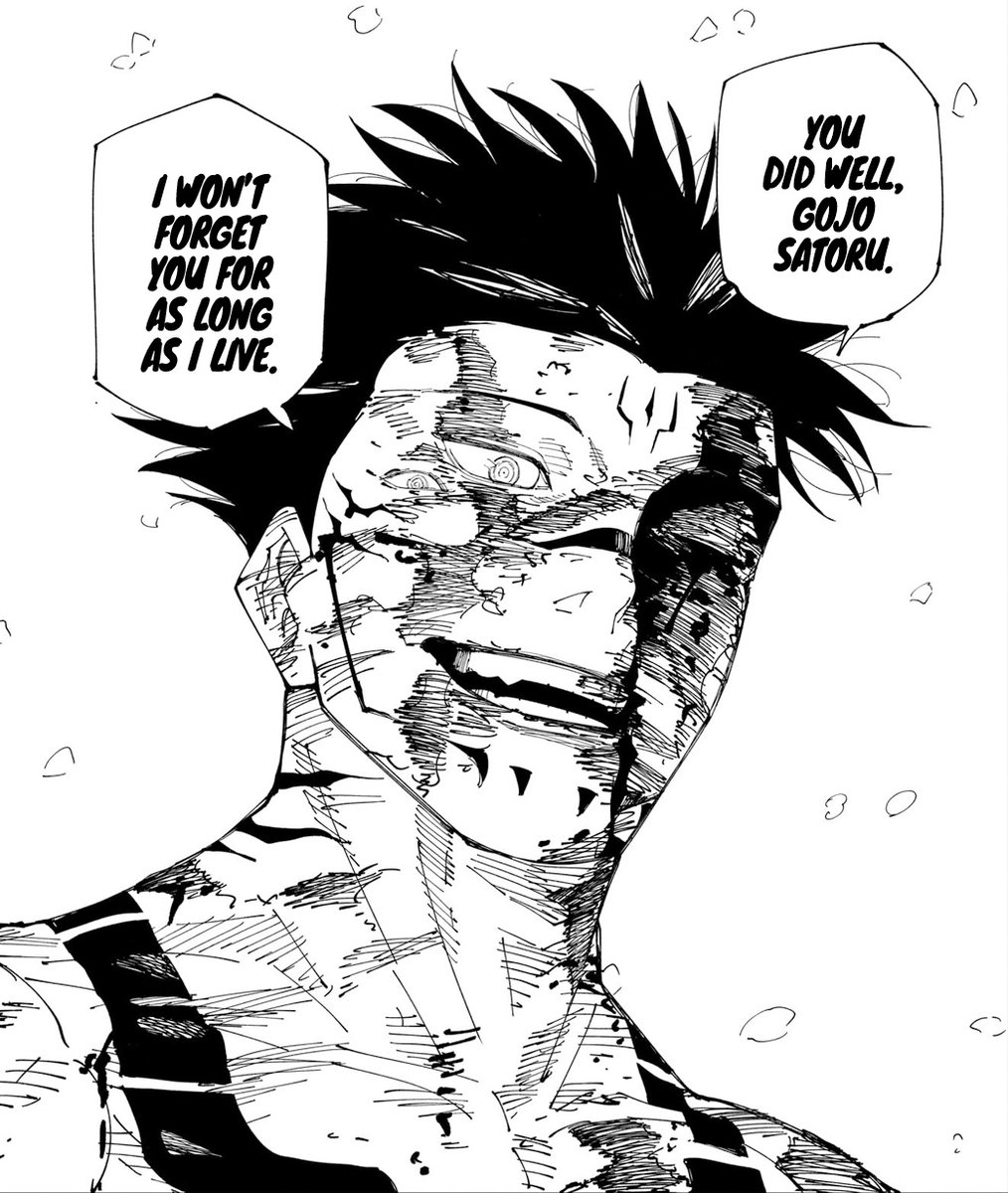
not only does this stress on the fact that Sukuna is independent of everything, even the narrative that consistently serves him, it also concludes Gojo's own identity crisis in a sense.
the fight started with Sukuna calling Gojo a nameless fish.
the fight started with Sukuna calling Gojo a nameless fish.
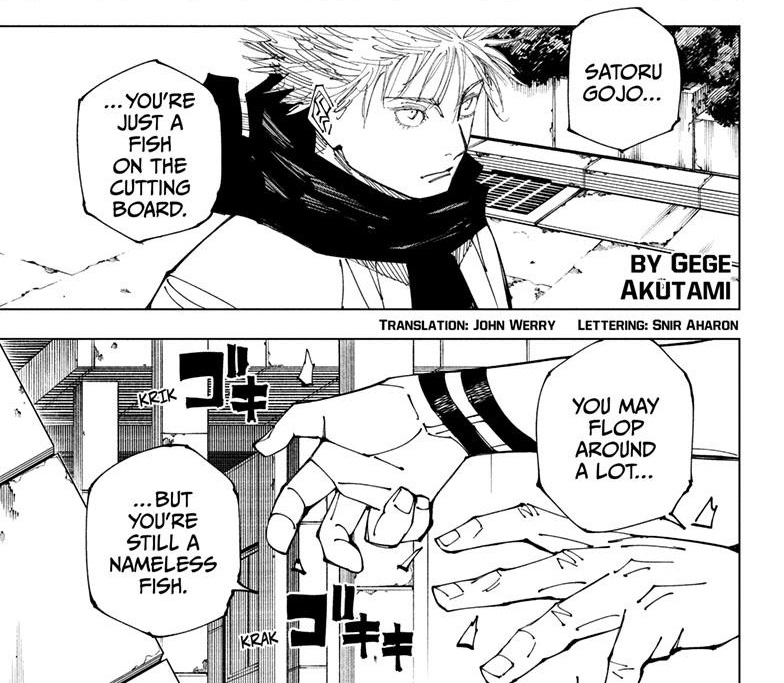
but it ends with Sukuna remembering Gojo by name. he doesn't call him strong. that would simply affirm the burden Gojo has had to carry for so long.
a fight for Gojo Satoru's sake cannot end like that.
a fight for Gojo Satoru's sake cannot end like that.
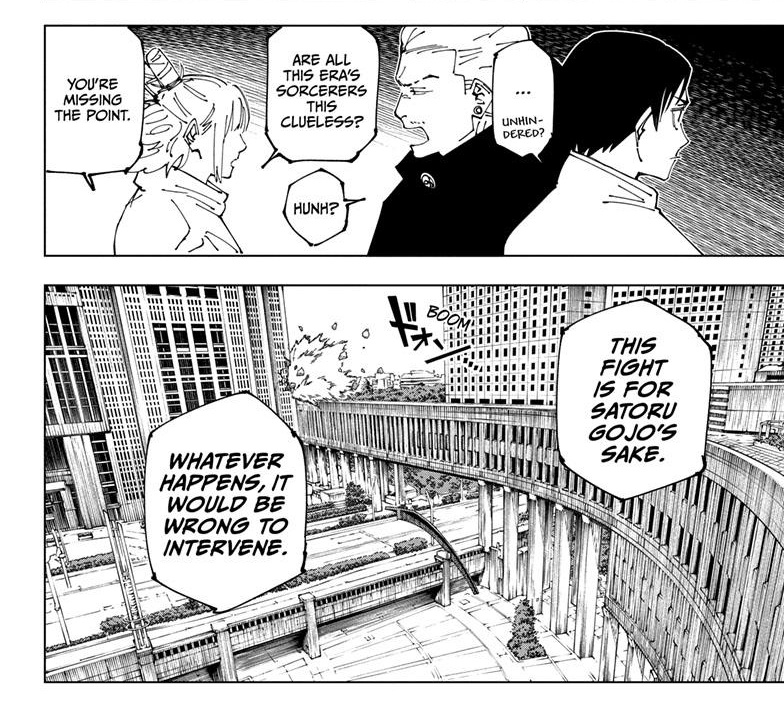
Sukuna calling Gojo by his name, telling him he'll be remembered forever, symbolically absolves Gojo of his burden, and affirms his identity beyond his strength.
this is doubled by Sukuna doing the same via his actions.


this is doubled by Sukuna doing the same via his actions.
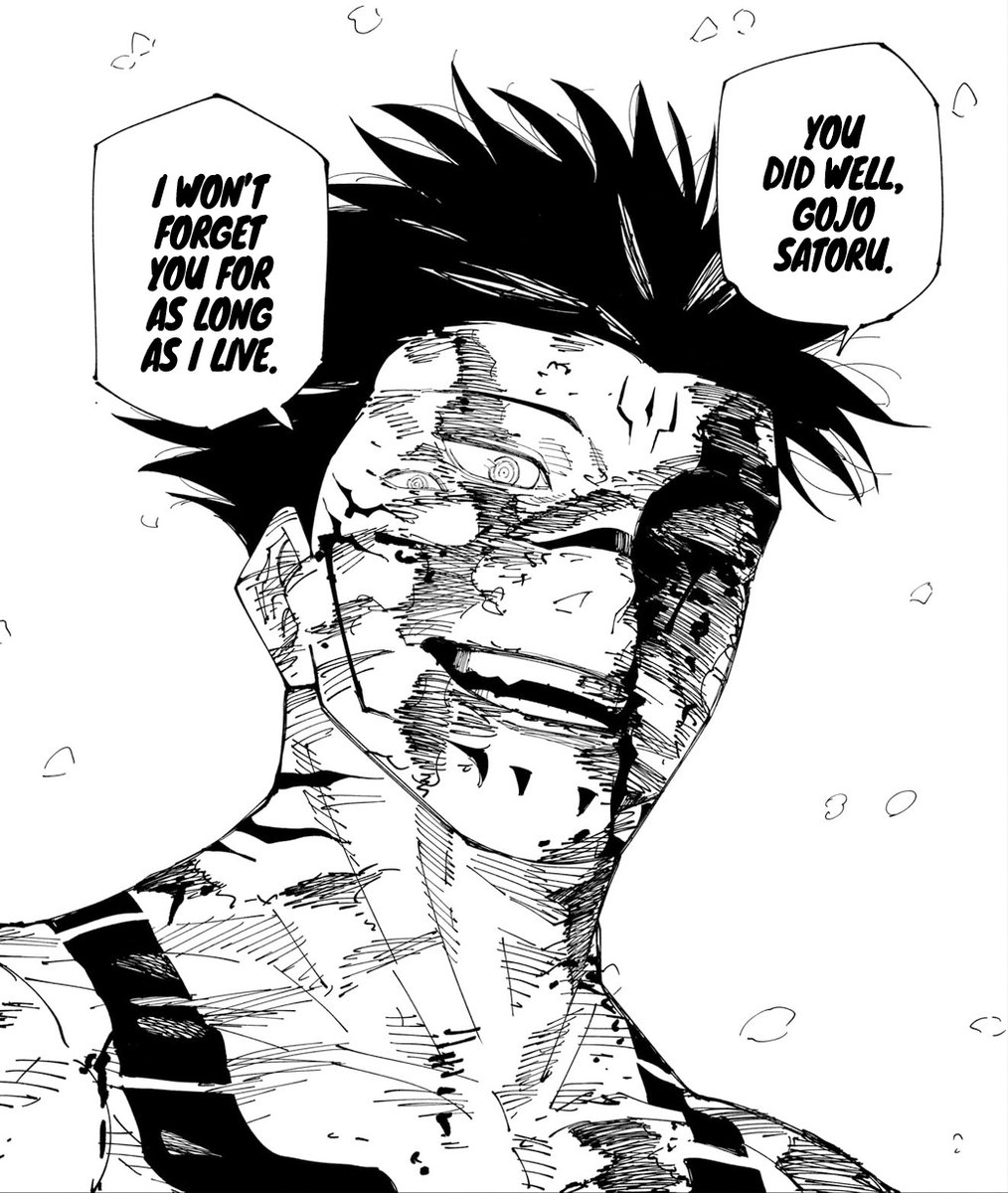
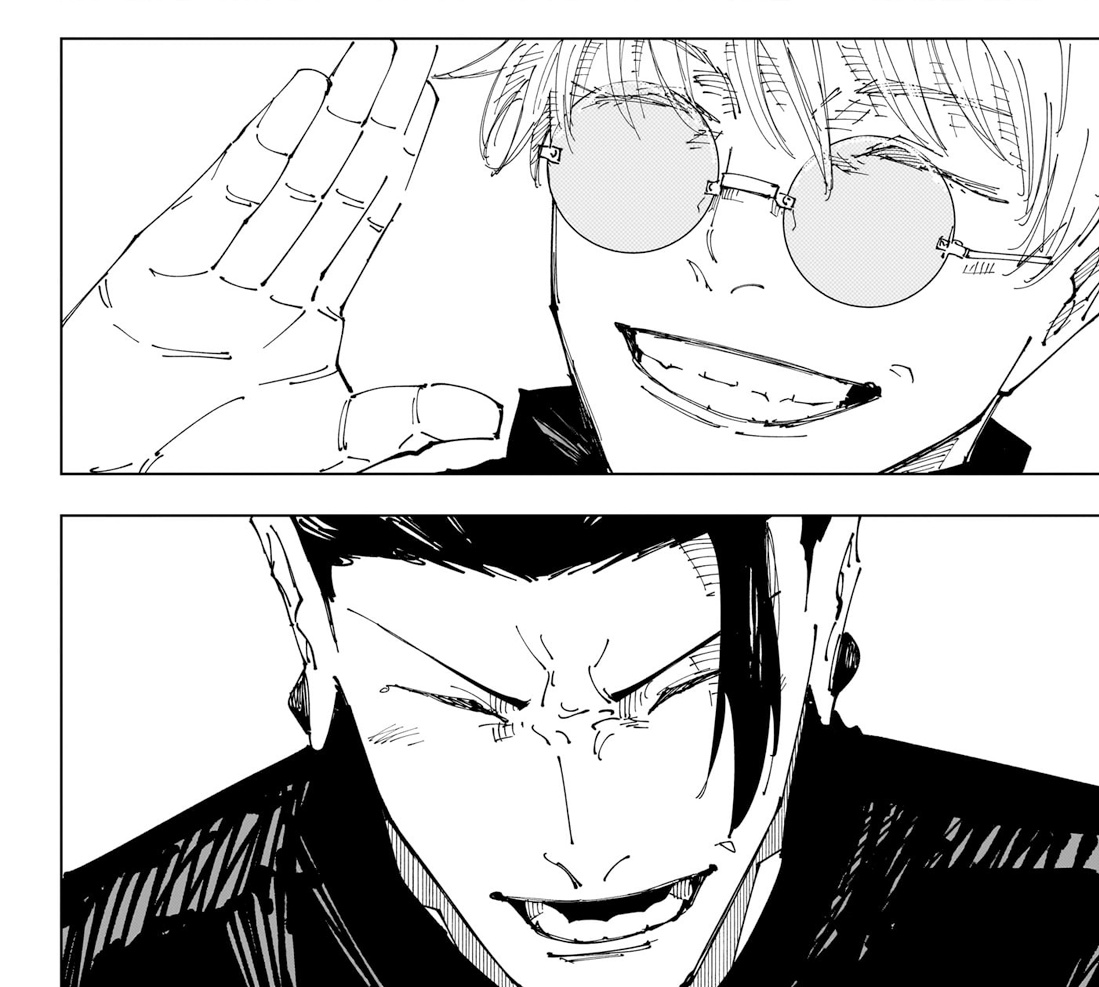
the function of Sukuna materially affecting the world that he resides in (referenced by "painting on air"), in his act of slashing the spacetime Gojo resides in, essentially reintegrates Gojo into the world by shattering the barrier that separates his existence from others.


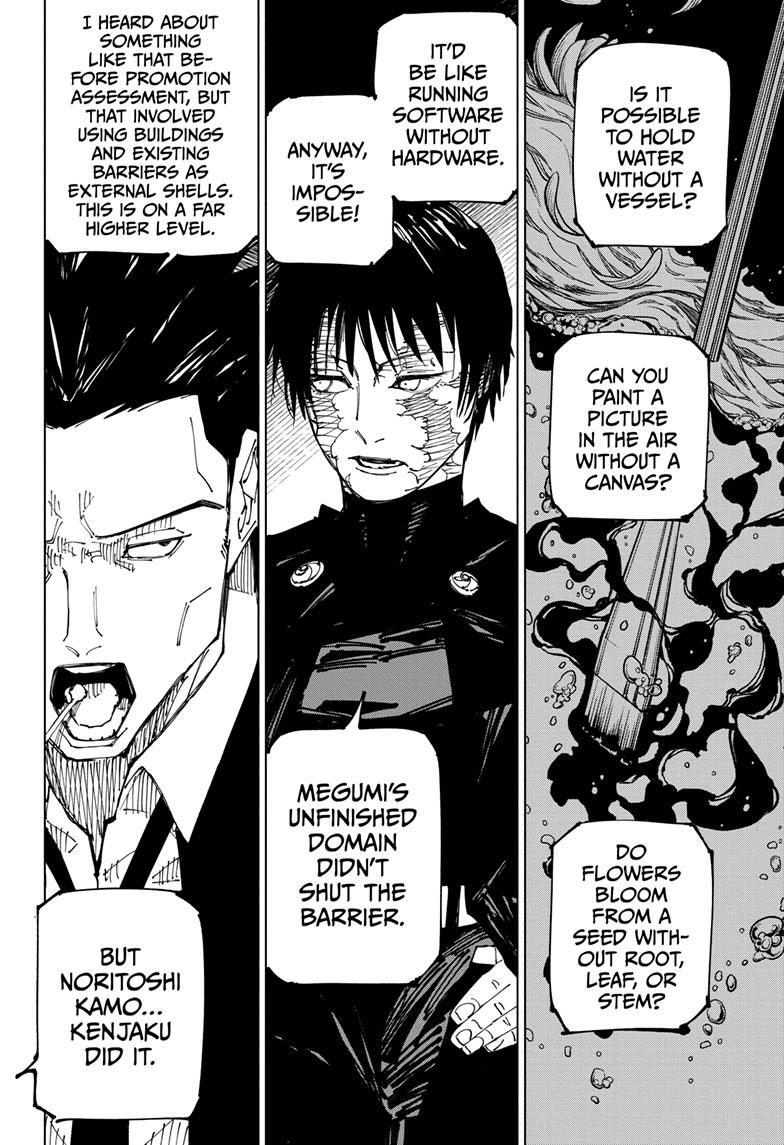
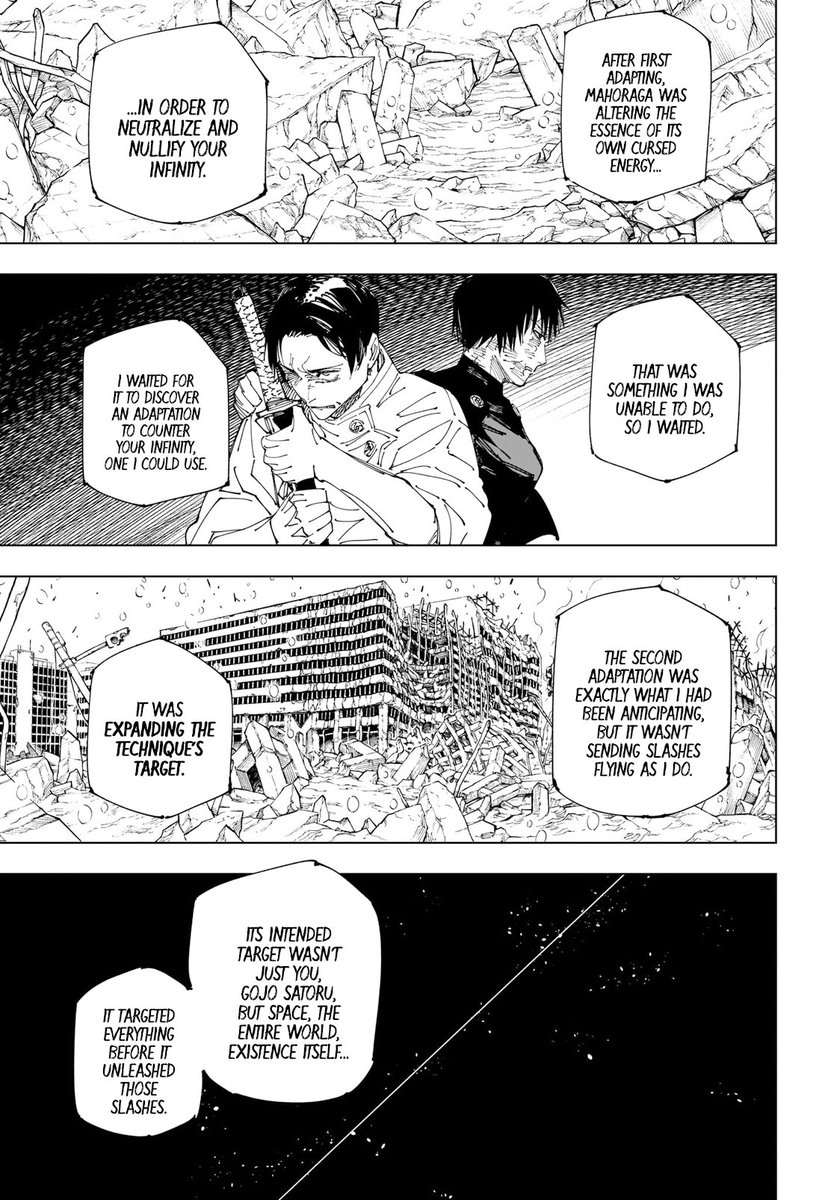
previously, anything that affected the world around Gojo wouldn't affect him.
this is what's so significant about the attack, and how it differs from things like the Inverted Spear of Heaven and Miguel's black rope. those things specifically target the cursed technique itself.
this is what's so significant about the attack, and how it differs from things like the Inverted Spear of Heaven and Miguel's black rope. those things specifically target the cursed technique itself.
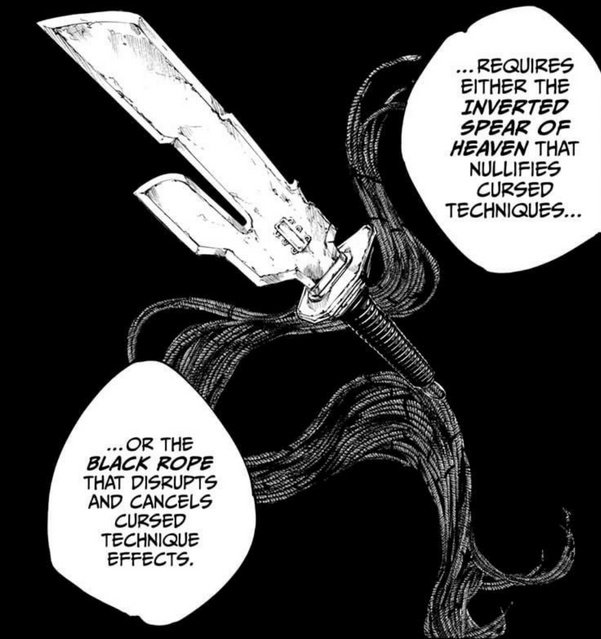
they don't exactly equate Gojo's plane of existence with the world around him. its just a challenge to Gojo's invulnerability, which circles back to feeding into his burden of being the strongest.
Sukuna, through words and action, brings to Gojo an answer to his identity crisis.
Sukuna, through words and action, brings to Gojo an answer to his identity crisis.
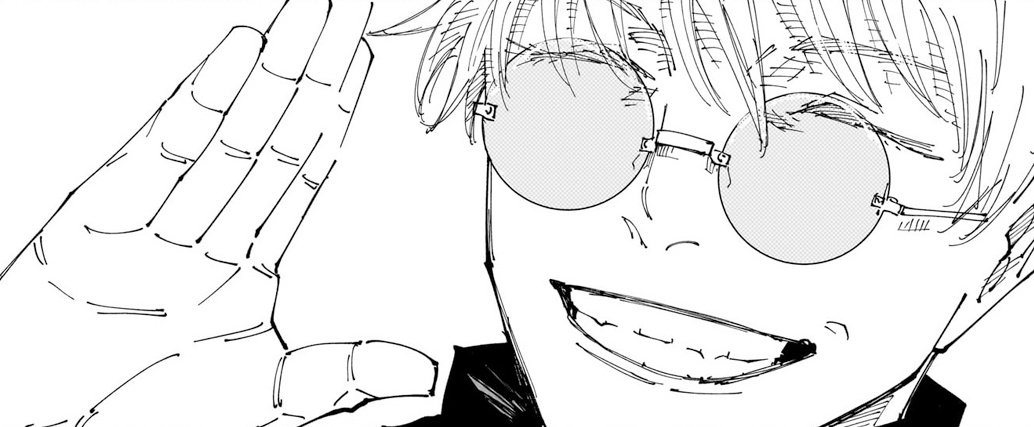
a very thematically fitting conclusion to the battle of the strongest.
i think this is by far the best fight of the series. its one of the best experiences I've had with JJK.
thank you for Gojo Satoru, Gege.
end of thread, thank you for reading ✌️
i think this is by far the best fight of the series. its one of the best experiences I've had with JJK.
thank you for Gojo Satoru, Gege.
end of thread, thank you for reading ✌️
• • •
Missing some Tweet in this thread? You can try to
force a refresh














